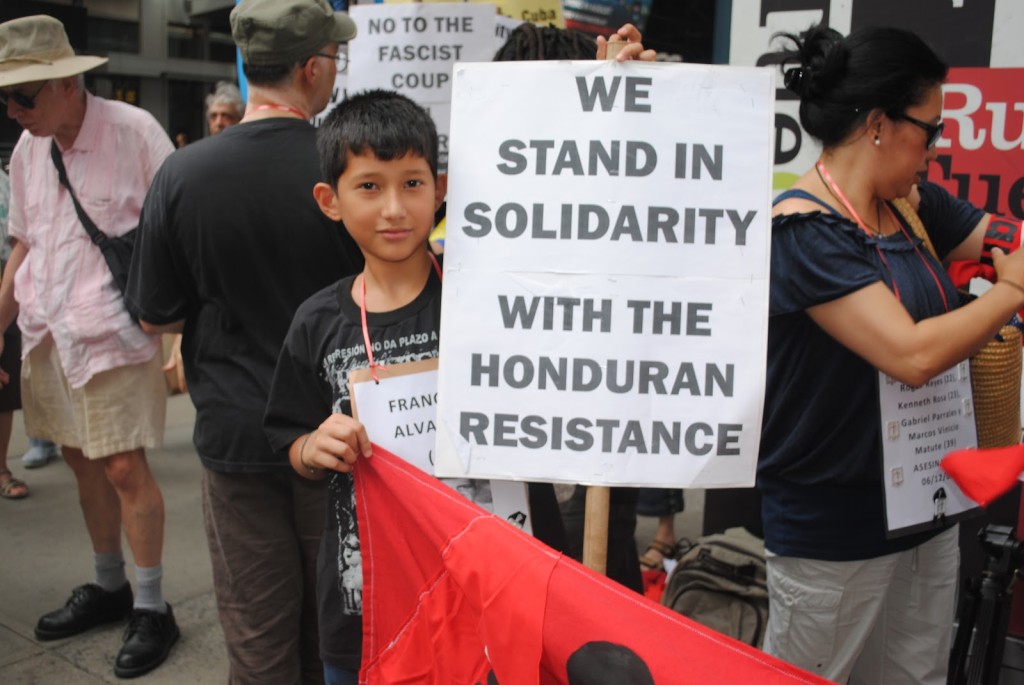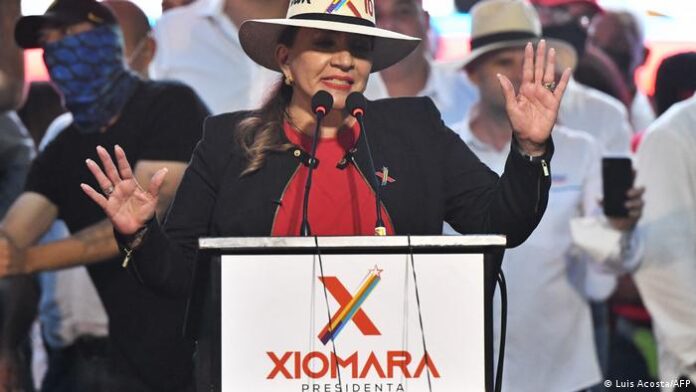
New Leftist President of Honduras, Xiomara Castro.
ACTION: Hondurans Are Moving Forward, Not Backwards!
Alliance for Global Justice & Judy Ancel / Labor Notes
(November 1, 2022) – In November 2021, Hondurans and international observers like ourselves, were relieved that the US government publicly accepted the Honduran election results, and the will of the Honduran people. The victory of Honduras’ first ever woman President, Xiomara Castro began the restoration of democracy in the country following nearly 13 years of a violent and corrupt dictatorship supported by multiple US administrations.
Less than a year since President Castro took office, we are now alarmed by public statements, actions, and tweets from the US Ambassador Laura Dogu, State Department officials, and some members of the US Senate that are actively interfering in Honduras’ internal affairs. These efforts appear to be aimed at undermining the new government and its policy agenda.
There are numerous examples of the tweets and statements pressuring Honduras about internal and foreign policy. On October 25, Ambassador Dogu spoke at a meeting of the Honduran American Chamber of Commerce (AmCham). She targeted Honduran initiatives passed or in discussion in Honduras’ National Congress that were part of President Castro’s election platform.
She strongly criticized reforms and changes to coup-dictatorship laws in the energy sector and labor law. Dogu accused the Honduran government of eliminating incentives for business investment saying, “even in the US Congress there is worry about how foreign investment is being treated in Honduras”.
That statement refers to the overturning, by a unanimous vote in the new Congress, of the “Special Development Zones – ZEDES” law that allowed for the creation of private corporate ownership (outside the control of the Honduran government) of “charter” cities. Her statement can only be seen as State Department support for a letter from Senators Cardin (D-MD) and Hagerty (R-TN) backing one of those private ZEDE corporations, Honduras Próspera.
The Senators’ letter echoed extremely conservative critics of President Castro’s speech at the United Nations and called for the State Department to intervene against the Honduran government (and therefore against the Honduran Congressional vote) on behalf of Próspera. This direct US intervention related to the ZEDEs comes as Honduras Próspera announces that it will begin an arbitration process under the Dominican Republic -Central America Free Trade Agreement (DR-CAFTA), allegedly seeking lost investment.
The Honduran government has made clear its position on the importance of good bilateral relations and economic assistance from the US while strongly objecting to interference in domestic and international affairs. The issues are serious enough that the Honduran Foreign Minister Enrique Reina, on request from President Castro, called the US Ambassador to a meeting on October 31st to formally present their complaints and protests regarding the intervention.
Given the US history of interference in internal affairs in Honduras and support for coups d’états including the 2009 coup, public interventions such as the Cardin/Hagerty letter and Ambassador Dogu’s statements are very dangerous for democracy in Honduras.
The US pressure on Congress, is occuring at a time when supporters of former President Juan Orlando Hernandez, now facing trial in New York for narco trafficking, are echoing Dogu and the Senator’s statements while calling for a new coup against the just-elected Castro presidency.
The US owes a debt to the Honduran people for its support of the coup government for twelve years as Honduras was destroyed with massive violations of human rights, economic collapse, and the rending of the social fabric that displaced thousands who fled the country. We had hoped that seeing these results, the State Department would now respect Honduran sovereignty and the will of its people. However, it appears that they are not.
Once again, we call on the US government to stop interfering in the domestic affairs of Honduras. If the US is serious about the Biden administration’s promise to get to the root causes of migration, then they should reflect on the lessons of history and not repeat it. The Honduran Solidarity Network in North America joins with the Honduran and international voices raised against attempts to push Honduras back towards the past!
Alliance for Global Justice, 225 E 26th St Ste 1, Tucson, Arizona 85713. (202) 540-8336. afgj@afgj.org

ACTION: Support Striking Honduran Workers
The Honduras Solidarity Network invites you to email the US State Department’s Honduras Desk noting that you are concerned about the disrespect shown Honduran workers building the new US embassy. Demand reinstatement of fired workers and insist that B.L. Harbert engage in good faith negotiations with the workers’ representatives.
Tweets can go here: @StateDept @WHAAsstSecty @USAmbHonduras. Anthropologist Adrienne Pine, who has been providing updates on the strike on Twitter, has started a Go Fund Me page to buy groceries for the workers.
Here is the article with info and the action info that appeared in Labor Notes.
/https://www.thestar.com/content/dam/thestar/news/world/americas/2019/05/31/honduran-protesters-set-fire-at-entrance-to-us-embassy/HON103-531_2019_094844.jpg)
Honduran Protesters Set Fire to US Embass Building
Construction Workers at New Embassy in Honduras
Strike over Severed Fingers, Illegal Contracts
(September 12, 2022) — The Biden administration has pledged that “the United States will work with governments to strengthen … the enforcement of labor laws, promote decent work, and support workers in exercising their freedom of association and collective bargaining rights,” as one of four pillars of its strategy to address the root causes of migration from Central America.
In Honduras today the US has an opportunity to practice this with the 1,100 workers it has hired to build a new embassy. But it’s blowing it.
Instead, police have been called in to bust a strike that’s been going on at the construction site in Tegucigalpa since early July.
Of course, the State Department and US Ambassador Laura Dogu all deny that there’s a problem with the treatment of the workers, and they’re pressuring the Honduran government to criminalize the strikers rather than enforce Honduran labor laws.

US Ambassador Laura Dogu.
Overseas Construction
Loads of federal construction occurs outside the US, away from the Davis-Bacon Prevailing Wage Act, the National Labor Relations Act, and the Occupational Safety and Health Act.
This construction is contracted by the State Department’s Bureau of Overseas Building Operations (OBO), whose webpage sports an impressive portfolio of American forts—disguised as ultra-modern architectural wonders — being built in just about every nook and cranny of the world.
Honduras’s new fortified and expanded embassy is no exception. Construction began in March 2019 and is due for completion in mid-2023.
Last May, Ambassador Dogu remarked at a reception commemorating the completion of the first phase of construction, “What is most important is that we invested in the Honduran people. The construction company B.L. Harbert used strong and talented Honduran labor to achieve this milestone in a short period of time. Currently around 1,000 Hondurans come to work and develop valuable skills.”
“Not true,” say the Honduran construction workers who are so fed up that they’ve seen no alternative but to strike.
Injured, Fired, and More
They say that B.L. Harbert Construction, an Alabama-based favorite of the State Department for many overseas projects, has repeatedly broken Honduran labor law by pushing illegal temporary contracts on the workers and failing to provide medical care or compensation to injured workers or to discipline racist supervisors.
The strikers display photos of workers with severed fingers in a report and on an ally’s Twitter. In order to avoid a documented injury which would entitle a worker to sue for compensation, workers said supervisors have bypassed the public hospital and taken some injured workers to a private clinic which does not report the injury; as a result, workers can’t access their medical files. Other injured workers are simply fired with no medical care.
In July, a labor law enacted during the regime of Juan Orlando Hernández (JOH) that permitted unregulated temporary contracts was repealed. (Hernández was president of Honduras from 2014 to January 2022, and is now being held in a US prison on charges of partnering with some of the largest cocaine traffickers in the world, who helped finance his political campaigns.) The former labor law which protects workers from firing without just cause was reinstated.
Strikers say the contracts B.L. Harbert unilaterally imposed contained an illegal probationary period, despite the fact that most workers had been working for the company for over ten months. This on top of other grievances precipitated the strike.
In August, when Harbert again tried to impose new contracts, 19 longtime workers were not given contracts, including the strike leaders. They say they were fired in retaliation for their organizing.
Harbert now adds Honduras to a trail of labor disputes in Turkey, Namibia, and Ghana.
International Solidarity
The workers, who do not have a union (most of the Honduran construction industry is unorganized) and are inexperienced in labor struggles have had some support from individuals in Honduran unions. They also reached out to the Honduras Solidarity Network in North America for help. We began a campaign to ask members of Congress to investigate the conflict.
I reached out to the OBO’s director of external affairs and media to get a story for my labor radio show. I asked her if the US government applies the same standards it has for federal construction under our labor laws at home to its building abroad, and if not, what standards do they use?
She said that every contract the State Department makes with builders requires compliance with local labor laws, wages sufficient to provide adequate calories, and other stuff which she couldn’t remember. She also said the strike was over, and there were only a handful of dissidents who were intimidating the other workers who wanted to go back to work.
Then she tried to retroactively take her comments off the record, and promised an official statement, which she never sent.
Under Pressure
So what’s the new left-leaning Honduran government of Xiomara Castro doing? The all-powerful US Embassy is pressuring them to break the strike, while the workers are demanding that they enforce the labor law.
The economy is a wreck after 13 years of corruption by the US-backed coup government. Former narco-dictator JOH, who is awaiting trial in New York, saddled Honduras with a debt worth nearly half of GDP which is owed mainly to US-controlled international financial institutions.
There’s also US Vice President Kamala Harris’s promise of public-private investments to resuscitate the economy. All this is at stake as Castro tries to improve the labor law and enforce it.
So far, Castro has tried to pacify the US ambassador by sending in several hundred cops who are blocking the workers from demonstrating at the construction entrance, and, according to strike leaders, hustling workers into the job site while accusing the leaders of violence.
Meanwhile, after weeks of trying, the workers have finally landed a meeting with the Minister of Labor on September 12.
The Honduras Solidarity Network asked the US House of Representatives International Workers Rights Caucus, led by Rep. Jan Schakowsky (D-IL), for help. She tweeted her solidarity with the striking workers and called on B.L. Harbert to comply with the law and respect workers rights. The Caucus met with the State Department and now must reconcile State’s “spin” with the workers’ adamant conviction that their rights have been violated.
Anthropologist Adrienne Pine, who has been providing updates on the strike on Twitter, has started a Go Fund Me page to buy groceries for the workers who are in dire straits after weeks on strike.
Take Action
- Email Bryan Schell at the State Department Honduras Desk:schellbk@state.gov
• Email William H. Moser, Director of the Bureau of Overseas Buildings Operations at the Department of State:moserwh@state.gov
• Contact your member of Congress and ask them to call or email William H. Moser: moserwh@state.gov - Ask all of them to:
1. Demand that B.L. Harbert reinstate the fired workers (the workers who were not given contracts — there were 19 of them including the leaders of the strike)
2. Demand that B.L. Harbert negotiate in good faith with the worker leaders to resolve their issues in conformity with Honduran labor and health and safety laws, including conforming with the law on reporting injuries and providing medical care and compensation for injured workers, and treating the workers with respect.
Judy Ancel is the producer of Kansas City’s Heartland Labor Forum radio show and president of the Cross Border Network.
Related
- Peak Season for Action at Amazon »
- A New Union, At Last? Mexican Auto Parts Workers Get to Vote, Three Years After Strike Wave »
- In a Landslide Victory, Mexican GM Workers Vote In an Independent Union »
- Labor Must Rise Against Vaccine Apartheid »
- Viewpoint: Building Trade Unions Won’t Win Our Parking Fights Until We Catch the Striketober Spirit »


